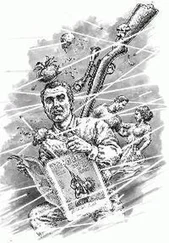Аврам Дэвидсон - Peregrine - primus
Здесь есть возможность читать онлайн «Аврам Дэвидсон - Peregrine - primus» весь текст электронной книги совершенно бесплатно (целиком полную версию без сокращений). В некоторых случаях можно слушать аудио, скачать через торрент в формате fb2 и присутствует краткое содержание. Год выпуска: 1971, ISBN: 1971, Издательство: New York : Walker, Жанр: sf_all, на английском языке. Описание произведения, (предисловие) а так же отзывы посетителей доступны на портале библиотеки ЛибКат.
- Название:Peregrine : primus
- Автор:
- Издательство:New York : Walker
- Жанр:
- Год:1971
- ISBN:0802755461
- Рейтинг книги:5 / 5. Голосов: 1
-
Избранное:Добавить в избранное
- Отзывы:
-
Ваша оценка:
- 100
- 1
- 2
- 3
- 4
- 5
Peregrine : primus: краткое содержание, описание и аннотация
Предлагаем к чтению аннотацию, описание, краткое содержание или предисловие (зависит от того, что написал сам автор книги «Peregrine : primus»). Если вы не нашли необходимую информацию о книге — напишите в комментариях, мы постараемся отыскать её.
Peregrine : primus — читать онлайн бесплатно полную книгу (весь текст) целиком
Ниже представлен текст книги, разбитый по страницам. Система сохранения места последней прочитанной страницы, позволяет с удобством читать онлайн бесплатно книгу «Peregrine : primus», без необходимости каждый раз заново искать на чём Вы остановились. Поставьте закладку, и сможете в любой момент перейти на страницу, на которой закончили чтение.
Интервал:
Закладка:
Peregrine took the tiller and sat down. He laughed, listening to the snores of the others, in quantity and volume almost beyond belief. A faint glow came from the setting moon, casting long and thick, deep shadows from the trees and hills. The cool air was clean, and the rank, musty smell of wool and sheepskin was somewhat fainter now. Something stirred in his mind, and he took the occasion to speak of it.
“Let me cite you a saying, Master,” he said. “May I—?”
“Cite away, sonny.”
“ ‘Burn the baleful signs indited on boards of beechwood ’ what does that signify to you?”
Some small sound of stirring night-life from the shore distracted the both of them for a moment; then the Eddessan said, thoughtfully, “Why . . . besides the fact of its author having a taste for alliteration . . . that the saying had its source either in or not far from some place where beech-trees grow. I’d not look for that source in, say, Syrene, or Babylon . . . And what does it signify to you, my cockerel?”
Peregrine considered if he should or not disclose to the Eddessan what Mother Boadicea had reded for him from the Sibylline Book. How well did he know him, could trust him? His answer came equally slow. “Why ... it is in some way connected with my fate and future . . .”
“And are you contented with your fate? Do you fear your future, with these baleful boards in it?”
“I am content enough, I wanted to see more of the world, and I am seeing more of it. And I wanted to have interesting adventures, and I am having them. No ... no ... I don’t fear my future, though naturally I have some concern about it. I wonder about my own place, now, in the world. I didn’t use to wonder about it, in my-native land my place, though subordinate and
limited, was both certain and agreeable. Each day was very like another. No day out in the wider world has, so far, been any very much like another.”
The Eddessan rather gently placed his hand on Peregrine’s wrist, and turned the tiller to port, the boat in turn turning to starboard. Water burbled quietly off a half-sunken log. Then he set her back on her previous course. “I am older than you by almost two generations,” he said. “I have travelled far. Of my joys and of my sorrows I do not now speak. Days differ, as people differ, face from face and nature from nature. But each body has the same set of bones as each other body. And so has each day. We lie us down, we rise us up, we eat and drink and stoop to stool. The day in which we do these simple services may not seem to be a particularly good one, but let a day come which prevents us from doing any of those, and we may rightfully look back upon a day which did not, and say, ‘Ah . . . That was a good day, yes! That day I was and did well!’ ”
Peregrine sighed and shifted and cleared his gullet, the way young people do when in receipt of good counsel. “Yes, yes, and so . . . But I am younger than you, Master, by almost two generations, and I have not travelled far. And I do hope that the time is not yet come for me when I can say of a good day only that I lied me down, I rose me up, I ate and I drank and I stooped to stool. This would be a good day for a poor man’s dog, sir, but tis not yet to be accounted in its bare bones as a good day for Peregrine the son of Paladrine; no, sir.”
Eugenius chuckled softly. Then he half-arose and he peered full into the darkness, cupping his ear. “WaS that not the belling of a full-grown stag? And are those not three small eddies, one after the other? And is this not the quiet cove I am seeking of? Pere-boy, crouch by the jib and put your arm up, but limberly, with line in that hand—if a tree-limb touch it by my count of three, toss the line over the limb, and so make fast this barge.”
It came about just as he predicted. Peregrine turned to see the other lifting the pane of horn in the ship’s lamp and opening his lips to blow the wan flame out. “Master, has a name been set to this place?” he asked.
Eugenius shook out a sheep’s pelt which had escaped the general exodus of the fleeces, and spread it under the bench. “Aye. Tis called the Upper Cove on Tufa Island . . . And now,” he
AVRAM DAVIDSON
[ 91 ]
said, lowering himself rather stiffly, and drawing his cloak around him, “now 1 shall compose my limbs for sleep and my thoughts upon the Sacred Serpent, particularly in its present manifestation as this river, which has twice afforded us escape: and you may keep watch and ward.”
Gradually, his eyes growing more accustomed to the darkness, though the lamp was out and the moon had set. Peregrine could or thought he could see better: and he saw a line of something light-colored, which he took for a beach of sorts: and he thought that it might be pleasant to go for a swim when it was light enough. Already he missed the comforts of a daily bath. Venus burned bright and great and cast her own shadows, and he bethought him of the temple in her name in Sapodilla Town, with its good marble copy of a good Grecian statue, slender and white: though the peasantry preferred to worship her in a cave in the forest in the form of a squat, dark stone, rudely carved in the semblance of a female with enormous breasts and enormous belly and enormous buttocks, under the fond, familiar title of Big Mamma; disdaining all specious fashion and intent upon fundamentals only.
He thought of his first visit to that cave in company of his brother Austin, and with that his thoughts began to stray into wonderment as to where this older and so well-beloved brother might have gone to, and to what the chances of their being together again might be. And then he felt a hand take his ankle and even while the hairs rose upon his flesh and one hand groped for a weapon and his lips opened and closed, he heard the voice of Eugenius saying, “Summon the next watch.”
He stuck his toes into Claud’s ribs, who muttered, “C’mere, honey .. . Hey? . .. Honey? . . . Oh. You. Cacadaemon!”
Despite Claud’s strenuous activities in the establishment of Matron Eudoxia, he had still (Peregrine observed) or again, a singularly heavy prong. Himself rolling up in the warmed blanket, he began to think of the events of the day until, soon enough, the night claimed him for her own.
He awoke, as he had fallen asleep, to the sound of a several battery of snores. Claud was in process of waking Appledore, and neither was disposed to converse, the one not yet fully apart from slumber and the other eager to return to it. Augustus the Penurious lay -sprawled in what would have seemed the full
throes of unheeding sleep, had Peregrine not noticed that at least some part of the man’s long body and long limbs was in contact with his baggage. And Eugenius the Eddessan, though dawn was breaking, puffed softly in and out between his cloak and his sheepskin.
There seemed no immediate prospect of any sudden burst of activity and departure, so Peregrine did no more than poke up the caboose for an ember and set a few charcoals upon it so that there might be fire enough when needed; then he stripped himself bare and slid by rope’s aid down the side of the ship, noiselessly, into the cold, clean water. He was no great swimmer, the few ponds and one lake of his native state not producing any such, but he made his way well enough, and silently enough, by the stroke they called “frog-paddle.” At first he thought to make directly for the beach, but there was still grey and mist all about, and no great pleasure to be had in shivering on the sands. Instead, he tackled the current, which was somewhat strong on this side of the Island, at least, with intent to drift back towards the beach on it when the day had had a chance to warm; and also he took care to keep within sound or sight of the boat, in case. Aside from this he was as mindless as any water-creature, and now he sported on the surface of the waves and now he bobbed his feet along the softy bottom and now and then he submerged and swam between the two. He had just surfaced and was about to snort and bubble when the illusion of a voice said what seemed to sound in his water-clogged ears as, “The Great White Christ . . .”
Читать дальшеИнтервал:
Закладка:
Похожие книги на «Peregrine : primus»
Представляем Вашему вниманию похожие книги на «Peregrine : primus» списком для выбора. Мы отобрали схожую по названию и смыслу литературу в надежде предоставить читателям больше вариантов отыскать новые, интересные, ещё непрочитанные произведения.
Обсуждение, отзывы о книге «Peregrine : primus» и просто собственные мнения читателей. Оставьте ваши комментарии, напишите, что Вы думаете о произведении, его смысле или главных героях. Укажите что конкретно понравилось, а что нет, и почему Вы так считаете.






